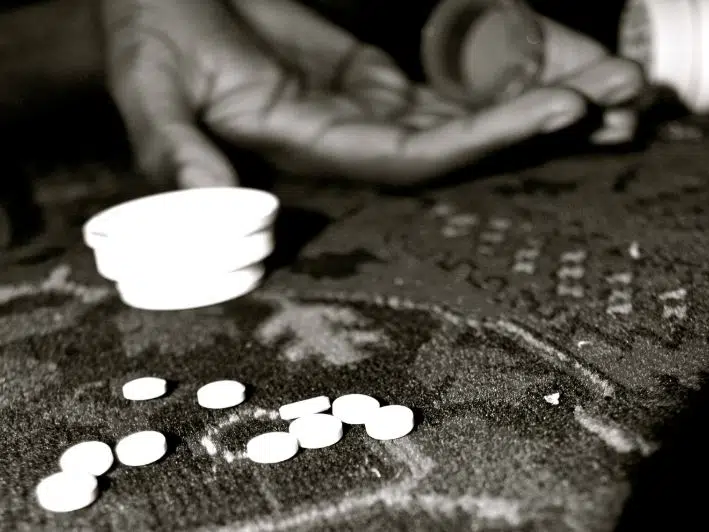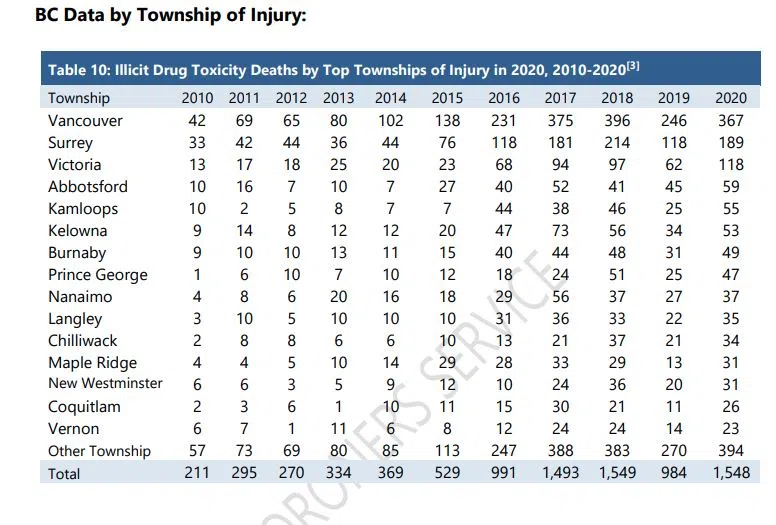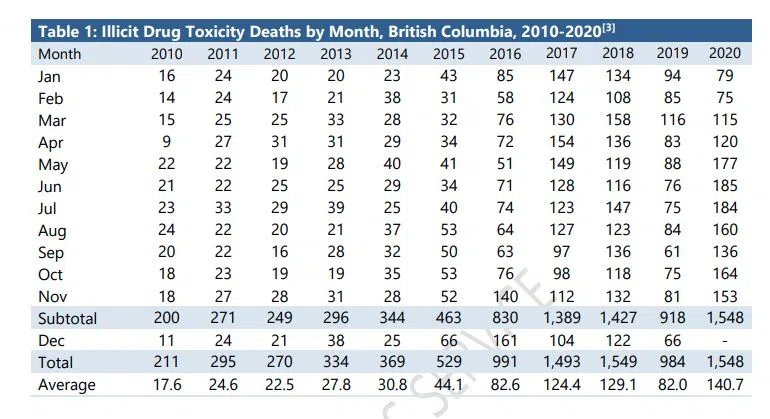
Another grim month in British Columbia with another 153 overdose deaths reported in November, taking the provincial total to 1,548 – just one shy of the record set back in 2018.
Five of those deaths were in Kamloops which has now recorded 55 overdose deaths in the first eleven months of the year – 48 a result of fentanyl – further extending the record of 50 deaths set back in October.
While November’s numbers are a seven per cent decrease from the 164 deaths in October, it is still an 89 per cent increase from Nov. 2019 which had 81 overdose deaths. People between the age of 30 and 59 account for 70 per cent of the deaths this year, with men accounting for 81 per cent of all overdose deaths this year.
“Tragically, as we reach the end of 2020, our province is facing a record-breaking year for lives lost due to a toxic illicit drug supply,” said Lisa Lapointe, chief coroner, noting the data still amounts to five people losing their lives to an overdose everyday in the province.
“In the five years of this public health emergency, more than 6,500 families have experienced the grief and sadness of losing a loved one to the challenging medical condition of drug addiction. I extend my sincere condolences to all of those grieving a family member, friend or colleague due to this disease.”
The data also shows that the number of deaths in each health authority is at or near the highest ever monthly totals. Interior Health has seen 248 overdose deaths, breaking the record of 246 set in 2016.
“The impacts of COVID-19 have been deadly for those experiencing problematic substance use,” Lapointe added. “Ensuring access to critical harm reduction measures including naloxone, supervised consumption sites, overdose prevention sites and drug checking services are essential if we want to prevent future deaths.”
“Providing those with substance use disorder access to pharmaceutical alternatives will be of immense benefit to reduce the harms and suffering resulting from the ‘for-profit’ illicit drug market.”
Lapointe also says as recommended by coroners’ inquest juries and death review panels, an accessible, evidence-based and accountable treatment and recovery system is desperately needed to support people who are looking for support as the look to recover from their addictions.
Back in September, provincial health officer Dr. Bonnie Henry allowed more health professionals to prescribe alternative drugs to those who are using toxic street drugs. Experts say the COVID-19 pandemic has had deadly consequences for people experiencing problematic substance use.
It has been five years since the opioid crisis was declared a public health emergency, but there were more cases with ‘extreme fentanyl concentrations’ from April to November, when compared to the year before.
“Before the pandemic, my predecessor, Judy Darcy, along with our front-line partners, did hard work to start building a system that brought overdose deaths down for the first time since 2012.” said Sheila Malcolmson, Minister of Mental Health and Addictions.
“COVID-19 has set us back with a dramatic spike in drug toxicity. I am committed to building on our unrelenting response to the overdose crisis, finding new ways to separate people from the poisoned drug supply, building more treatment and recovery beds, and moving forward on decriminalization to reduce stigma.”
Only Vancouver (367), Surrey (189), Victoria (118), and Abbotsford (59) have reported more overdose deaths this year than Kamloops, while Kelowna has seen 53 deaths in the first 11 months of the year.
“Just as there are many paths into addiction and mental health challenges, there are also many paths out. People need options and they need our compassion,” Malcolmson added.
“There isn’t a single family or person in the province who hasn’t been impacted in some way by the two public health emergencies. One life lost is one too many. I’m committed to continuing to connect more people to treatment and recovery services and save more lives.”
The BC Liberals say its time for the NDP to ensure that the necessary steps for a comprehensive mental health and addictions system are put in place.
“As records continue to be set throughout all of B.C.’s health authorities after more than three years in government, it’s never been more important to ensure the necessary steps are being taken by government for a comprehensive mental health and addictions system in B.C.,” added Trevor Halford, the Critic for Mental Health and Addictions
“Overcoming the overdose crisis will take more than a one-size-fits-all approach, and it’s now up the NDP to put words into action to help tackle this crisis.”

















